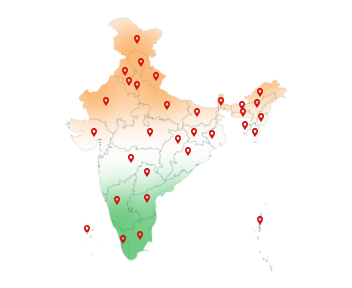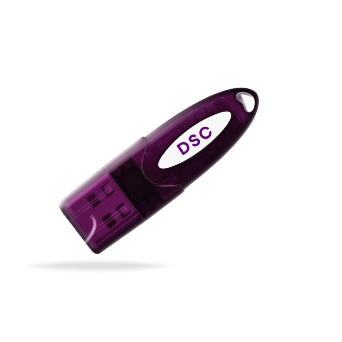16-Jun-2025
DSC in ICEGATE: Know the Portal, Process, and Purpose
India has seen a massive surge in global trade in recent years. Every day, thousands of containers arrive at ports, and just as many leave, carrying goods made in India to markets around the world.
Handling such large-scale trade manually would lead to massive delays and inefficiencies. That's why the government created ICEGATE—the Indian Customs Electronic Gateway—to move customs clearance into the digital age.
Whether you're importing a machine or exporting textiles, it lets you do everything from filing documents to paying duties—completely online.
And to make sure all this digital activity stays secure and legally valid, it makes it necessary to buy and use a Digital Signature Certificate (DSC).
Why was ICEGATE formed?
ICEGATE, or the Indian Customs Electronic Gateway, is the official digital platform of the Central Board of Indirect Taxes and Customs (CBIC). It serves as the central access point for all electronic interactions between businesses and Indian Customs.
Before ICEGATE came into existence, doing import or export in India was a time-consuming and paper-heavy process. Importers, exporters, and customs brokers had to physically visit customs offices, stand in long queues, submit multiple sets of documents, and wait for days—or even weeks—for approvals and clearance.
There were several problems with this manual system:
- Delays due to physical paperwork and limited working hours
- Errors caused by manual data entry and document handling
- Lack of transparency, since traders didn't know where their file stood in the process
- Higher costs, both in time and money, especially for small businesses
- Difficulty in tracking shipments or updates, which often led to missed deadlines
The Indian government recognized that to support a growing economy and encourage increased international trade, these issues needed to be addressed. That's when ICEGATE (Indian Customs Electronic Gateway) was formed.
Main Goal of ICEGATE:
The main goal of ICEGATE was to digitize and simplify India's customs process. It was developed to allow importers and exporters to file documents online instead of dealing with piles of paperwork.
By automating most steps, ICEGATE helps reduce human errors and speeds up approvals. It also provides round-the-clock access, so users aren't limited to office timings. Most importantly, it removes the need for physical visits to customs offices by offering a single digital platform where all customs-related activities can be done anywhere.
In contrast, the Old ICEGATE portal lacked real-time integration and modern security protocols, which are now standard in the current system. With tools like DSC in ICEGATE, today's portal ensures secure access and real-time updates that the Old ICEGATE portal could never. Such upgrades played a critical role in building trust and reliability in India's digital customs ecosystem.
History of ICEGATE
Original Roots: Indian Customs EDI System (ICES)
Before ICEGATE, the Indian Customs EDI System (ICES) was developed in 1995 to automate customs operations at select ports and airports. This system allowed internal customs offices to handle documentation and clearance processes digitally, but it was not publicly accessible to traders or brokers.
Launch of ICEGATE
To bridge the gap between the customs department and external trade stakeholders (like importers, exporters, shipping lines, banks, etc.), the Indian Customs Electronic Gateway (ICEGATE) was introduced. It was built on top of the ICES platform as a user-facing online portal.
So, ICES worked behind the scenes, while ICEGATE became the public interface where users could file documents, make payments, and track clearances online.
From Basic Portal to Full Trade Gateway
Over the years, ICEGATE transformed from a simple portal into a one-stop gateway for all customs-related digital services:
- Integration with ICES for seamless backend processing
- Addition of e-Sanchit, Single Window Interface, DSC support, real-time tracking, and more
- API connectivity and advanced security tools in the 2020s
Core Services Provided by ICEGATE
ICEGATE is not just a portal—it's the central hub for a wide range of digital services that power India's import-export ecosystem. Here are the core services you can access through the ICEGATE portal:
1. Electronic Filing of Customs Documents
ICEGATE allows registered users to electronically submit customs documents such as:
ICEGATE Bill of Entry (for imports) – Filed by the importer to declare details of incoming goods and pay customs duties before the items are cleared.
ICEGATE Shipping Bill (for exports) – Filed by the exporter to declare goods being shipped out of India and to get customs approval for export.
Import General Manifest (IGM) and Export General Manifest (EGM) – Filed by carriers (like airlines or shipping lines) to list all goods arriving (IGM) or leaving (EGM) the country, helping customs verify cargo details.
2. Online Payment of Customs Duties
ICEGATE integrates with authorized banks and the Reserve Bank of India (RBI) to offer a secure e-payment service. Users can pay:
- Customs Duty
- IGST
- Surcharge or Cess
The payment is automatically linked to the filed document, enabling quicker clearance.
3. E-Sanchit: Electronic Document Upload
Through e-Sanchit, users can upload supporting documents (invoices, licenses, certificates) in digital format. This eliminates the need for physical document submission and allows automated linkage with customs filings.
4. Single Window Clearance (SWIFT)
ICEGATE facilitates Single Window Interface for Facilitating Trade (SWIFT)—a service that allows simultaneous clearance from multiple government agencies, like:
- DGFT
- FSSAI
- Textile Committee
- Drug Controller and more
This saves traders from approaching each department separately.
5. Customs Query Redressal System
As part of document processing, customs may raise objections or seek clarification. ICEGATE offers a Query Redressal Service where users can respond directly, upload any additional documents, and track query status online.
6. Track Shipment and Clearance Status
ICEGATE provides real-time updates on your shipments and document processing. Whether it's the ICEGATE shipping bill status showing pending approval, under examination, or already cleared, you can easily track the progress online without visiting the customs office.
Who needs to do the ICEGATE Registration?
Any entity involved in the movement, clearance, or regulation of international goods in India will need ICEGATE. Here's who should register:
Importers and Exporters – Any person or business that brings goods into India (import) or sends goods out of India (export).
Customs Brokers (CHA) – CHA stands for Customs House Agent. These are licensed professionals who help importers and exporters deal with customs paperwork and procedures.
Shipping Lines and Agents – These are companies or agents that transport goods by sea and manage shipping operations.
Airlines – Airlines that carry goods by air also need to interact with customs and must register on ICEGATE.
Freight Forwarders – These are companies that help plan and manage how goods are moved from one country to another.
NVOCC (Non-Vessel Operating Common Carrier) – A company that arranges shipping for cargo but doesn't own ships. They work like freight forwarders but issue their bills of lading.
Console Agents – These agents combine small shipments from different customers into one large shipment to save cost and space.
Authorized Terminal Operators – Companies that manage cargo handling at ports or terminals.
Custodians – Organizations that are in charge of storing goods in customs areas (like warehouses at ports) until they are cleared.
CTO (Container Train Operator) – These are operators that move goods across India using container trains.
PGA (Participating Government Agencies) – These are government bodies like FSSAI (Food Safety and Standards Authority of India), AQCS (Animal Quarantine and Certification Services), WCCB (Wildlife Crime Control Bureau), and others that need to check and approve certain types of goods.
E-Seal Vendors – These companies provide electronic seals for containers to make sure they are not tampered with during transport.
ECCS (Express Cargo Clearance System) Entities – These are courier companies that handle the import and export of international parcels and express cargo.
SEZ (Special Economic Zone) Entities – Businesses that operate in areas specially set up by the government with tax and trade benefits. They also need to use ICEGATE for customs-related tasks.
Non-IEC Holders / UIN Holders – Not everyone has an IEC (Import Export Code). Some organizations, like foreign embassies, United Nations bodies, or certain government institutions, may have a UIN (Unique Identification Number) instead and still need to register on ICEGATE.
Which Documents Do You Need for ICEGATE Registration?
For ICEGATE registration, you need to keep certain documents and details ready. These help verify your identity and allow customs to link your business correctly in their system.
1. Import Export Code (IEC)
This is a 10-digit code issued by the DGFT (Directorate General of Foreign Trade). It's mandatory for any business involved in import or export.
2. GST Identification Number (GSTIN)
If you're registered under GST, you'll need to provide your GSTIN. This helps customs match your trade data with tax records.
3. PAN (Permanent Account Number)
PAN of the business or individual (depending on who is registering) is required to confirm identity and for tax verification.
4. Aadhaar (for individuals)
If you're registering as an individual user (like a CHA or proprietor), Aadhaar may be needed for identity verification.
5. Valid Email ID and Mobile Number
This is where all communication from ICEGATE will happen. Make sure they are active and accessible.
6. Digital Signature Certificate (DSC in ICEGATE)
A Class 3 Digital Signature Certificate or DSC in ICEGATE is needed to complete registration and for filing documents securely.
Still don't have a Class 3 DSC? Get one today from Capricorn, one of the most trusted Digital Signature Providers near you.
7. Authorization Letter or Commercial License (if applicable)
If someone else is doing the ICEGATE registration on behalf of your business (like an employee or consultant), a signed authorization letter may be required.
How to Register on ICEGATE?
Here's how you can register on the ICEGATE portal:
Visit the official website
Go to the ICEGATE portal through: www.icegate.gov.in
Choose your registration method
You'll see two options:
- Register with Reference ID – If you had started earlier and saved your form.
- Register without Reference ID – For new users starting fresh.
Select your user role
Choose your category, such as Importer, Exporter, Customs Broker (CHA), Freight Forwarder, Shipping Line, SEZ Unit, etc.
Enter your IEC and GSTIN
Provide your Import Export Code (IEC) and GST Identification Number (GSTIN). These details will be verified with DGFT and GSTN records.
Verify your contact details
Your email ID and mobile number (fetched from GST or DGFT records) will need to be verified through OTP.
Fill in all the details
You'll need to fill in your details and upload the required documents in the role registration form:
Submit your registration
You can either save as a draft (valid for 15 days) or submit the form after completing all fields.
Get your login credentials
Once verified and approved by ICEGATE, your login ID will be shared with your registered email.
Conclusion
ICEGATE has completely changed how businesses in India deal with customs. What used to take days of paperwork and long queues can now be done online from anywhere. You can file your ICEGATE Bill of Entry, check your Shipping Bill status, upload documents, and even pay customs duties—all in one place.
But for this system to work smoothly and safely, there has to be trust and security. That's where the Digital Signature Certificate (DSC) comes in. It makes sure that the documents being submitted are coming from the right person or company.
Whether you're an importer, exporter, customs broker (CHA), SEZ unit, or any other role involved in international trade, using DSC in ICEGATE is not just required—it's what keeps your online customs work legal, secure, and reliable.


